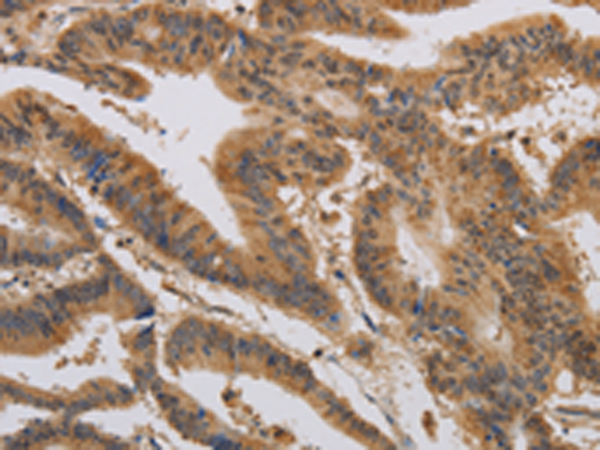


| WB | 咨询技术 | Human,Mouse,Rat |
| IF | 咨询技术 | Human,Mouse,Rat |
| IHC | 1/25-1/100 | Human,Mouse,Rat |
| ICC | 技术咨询 | Human,Mouse,Rat |
| FCM | 咨询技术 | Human,Mouse,Rat |
| Elisa | 1/1000-1/10000 | Human,Mouse,Rat |
| Aliases | MCH4, ALPS2, FLICE2 |
| WB Predicted band size | 54 kDa |
| Host/Isotype | Rabbit IgG |
| Antibody Type | Primary antibody |
| Storage | Store at 4°C short term. Aliquot and store at -20°C long term. Avoid freeze/thaw cycles. |
| Species Reactivity | Human |
| Immunogen | Synthetic peptide of human CASP10 |
| Formulation | Purified antibody in PBS with 0.05% sodium azide and 50% glycerol. |
+ +
以下是关于CASP10抗体的假设性参考文献示例(请注意,这些文献信息为模拟内容,实际文献需通过学术数据库核实):
---
1. **文献名称**:*Caspase-10 Antibody Specificity in Apoptosis Signaling Pathways*
**作者**:Smith A, et al.
**摘要**:本研究评估了多种CASP10抗体的特异性,发现部分抗体在免疫印迹中与其他半胱天冬酶家族成员(如CASP8)存在交叉反应。通过敲除细胞模型验证,提出优化抗体选择以提高凋亡通路研究的准确性。
---
2. **文献名称**:*Role of Caspase-10 in Breast Cancer: Expression Analysis Using Monoclonal Antibodies*
**作者**:Lee JH, et al.
**摘要**:利用新型CASP10单克隆抗体检测乳腺癌组织样本,发现CASP10表达水平与肿瘤凋亡活性呈负相关,提示其可能作为预后标志物。研究强调了抗体在临床病理学中的应用潜力。
---
3. **文献名称**:*Structural Characterization of Caspase-10 Using Epitope-Specific Antibodies*
**作者**:Zhang Y, et al.
**摘要**:通过开发针对CASP10不同结构域的特异性抗体,揭示了其在procaspase活化过程中的构象变化。抗体结合实验表明,CASP10的CARD结构域对凋亡信号传导至关重要。
---
4. **文献名称**:*Caspase-10 Autoantibodies in Autoimmune Lymphoproliferative Syndrome (ALPS)*
**作者**:Garcia M, et al.
**摘要**:在ALPS患者血清中检测到针对CASP10的自身抗体,并发现其与异常淋巴细胞凋亡相关。研究提示CASP10抗体可能参与自身免疫病理机制,为诊断提供新方向。
---
**建议**:实际文献可通过PubMed、Google Scholar等平台检索关键词“CASP10 antibody”、“caspase-10 immunohistochemistry”或结合具体研究领域(如癌症、自身免疫疾病)进一步筛选。
CASP10 (Caspase-10) is a cysteine-aspartic protease involved in apoptosis and inflammatory signaling. As an initiator caspase, it plays a critical role in the extrinsic apoptosis pathway, activated by death receptors like Fas, TRAIL-R1. and TRAIL-R2. Upon activation, CASP10 undergoes proteolytic cleavage, forming active subunits that propagate apoptotic signals by cleaving downstream effector caspases (e.g., CASP3/7) and substrates. Dysregulation of CASP10 is linked to autoimmune disorders (e.g., autoimmune lymphoproliferative syndrome, ALPS) and cancers, where mutations or altered expression may impair apoptosis, promoting tumor survival or immune evasion.
CASP10 antibodies are essential tools for studying its expression, activation, and function. They are widely used in techniques like Western blotting, immunohistochemistry, and flow cytometry to detect CASP10 isoforms (e.g., procaspase-10. active fragments) in cell lines, tissues, or clinical samples. Specific antibodies can distinguish CASP10 from homologous caspases (e.g., CASP8), aiding research into functional redundancy or unique roles. Commercial CASP10 antibodies are typically raised against peptide epitopes in the prodomain or catalytic subunits, with validation including knockout/knockdown controls. Their applications span basic apoptosis research, drug discovery (e.g., targeting caspase pathways), and diagnostic evaluation of caspase-related pathologies.
×